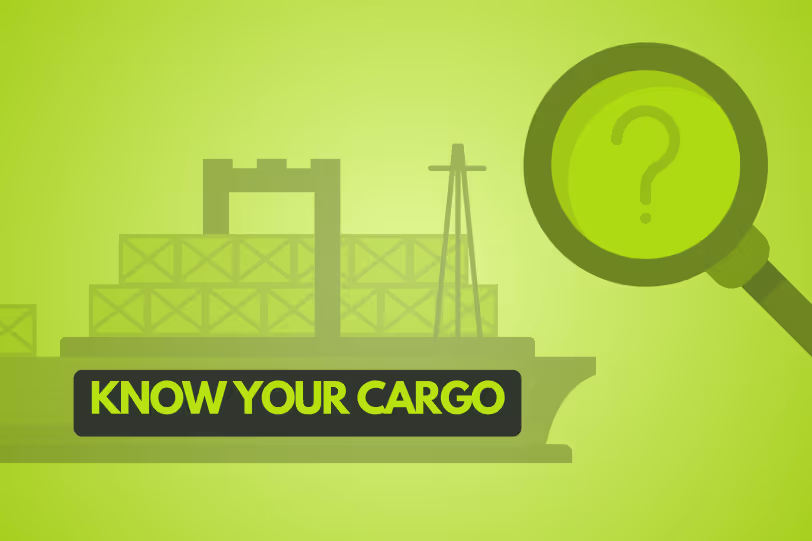
Insights From the US’s Know Your Cargo Compliance Note
Everyone in compliance knows this: the number of acronyms professionals use in the field is vast. For example, 'KYC' is usually associated with Know Your Customer. But this week, Know Your Cargo took center stage. Why? Several US government agencies issued a 'Know Your Cargo' joint compliance note, with information crucial for sanctions officers navigating global trade and supply chains. Curious? In this article, you will learn the report's key insights.
But before diving into the takeaways, let's quickly review what happened.
Know Your Cargo Compliance Note 2023: What Happened?
On December 11, 2023, five US government agencies, including the Office of Foreign Assets Control (OFAC), issued a joint compliance note. Here are the other departments involved:
- Department of Justice (DOJ)
- Bureau of Industry and Security (BIS),
- Homeland Security Investigations (HSI),
- Directorate of Defense Trade Controls (DDTC)
The joint note (open the full PDF by clicking the link) has three objectives.
First, it highlights common sanctions evasion tactics deployed by nefarious actors in maritime and other global transportation industries.
Second, the note reveals best practices to ensure compliance with US sanctions and export controls.
Third, it also reminds readers of the tremendous risk (financially and reputationally) of breaking sanctions laws in international trade, providing real case studies of penalties dished out by US authorities.
Know Your Cargo Compliance Note 2023: Why Now?
It's unclear why five US government agencies published the joint compliance note right now. On the surface, it is a routine update for the year-end that all compliance officers involved in global trade should review. Three countries are highlighted in the report:
- Russia
- Iran
- North Korea
However, sanctions evasion in the global maritime and international supply chain arenas has especially been a hot topic since Russia invaded Ukraine in 2022.
And in 2023, Russia - now the most sanctioned country in the world - has continued to circumvent thousands of sanctions placed on individuals, companies, organizations, and institutions by using third countries.
In this article, we cannot go into the entire modus operandi, but this is what's happening: Third countries such as Kyrgyzstan, Turkey, Kazakhstan, Uzbekistan, and Armenia are being used as what can be described as hubs.
How does it work?
Companies, for example, based in the European Union or the US, export goods such as high-tech semiconductors and advanced machinery to these jurisdictions (third countries).
The problem arises as these third countries serve as intermediary points and do not represent the ultimate destination for the products - they instead function as conduits to facilitate trade with heavily sanctioned nations such as Russia, Iran, and North Korea.
To give you an illustrative example of the problem, a recent tweet on X (formerly Twitter) by the Institute of International Finance's chief economist, Robin Cook, went viral.
Here is what he said:
"German exports of motor vehicles and parts (blue) to Kyrgyzstan are up 5500% since Russia invaded Ukraine. You don't have to be a rocket scientist to know that all this stuff is heading to Russia. It's not like Kyrgyzstan is suddenly in a massive boom. Germany has to stop this..."

Although the US government's latest Know Your Cargo compliance note is general, the Russian sanctions circumvention problem is getting the most attention from politicians, civil servants, journalists, and the international compliance community.
The following sections reveal the indicators of malign actors attempting to evade sanctions (according to the December 2023 joint compliance note). Also, crucially, the best practices businesses and organizations should embrace to mitigate the risk of their organizations being used in sanctions circumvention activities.
Recommended Reading: Deceptive Shipping Practices in Sanctions Evasion (And Why It's a Growing Concern)
Indicators of Malign Actors Attempting To Circumvent Sanctions
The joint compliance note dedicates a lengthy section to the potential indicators of sanctions evasion efforts. We'll review them in a moment. But first, it's essential to take on board that the strongest language appears in this part of the note.
So what does it convey?
The key message is that all entities involved in transporting, servicing, and financing goods in international trade must embrace measures to Know Your Cargo (to detect nefarious sanctions circumvention practices).
In this article, in the interest of brevity, we can't delve into this in detail - the note PDF expands on each point - but here are the indicators of nefarious practices:
- Manipulating location/identification data
- Falsifying cargo/vessel documents
- Ship-to-ship transfers
- Voyage irregularities and use of abnormal shipping routes
- Frequent registration changes
- Complex ownership or management
The question now is this: According to the joint compliance note, what best practices should your organization embrace to manage the problem?
Here Are The Best Practices Your Organization Needs to Deploy
Let's cut to the chase. The following bullets contain the most significant best practices that the US government agencies require and expect action on:
- Embedding sanctions compliance programs in your organization
- Establishing location monitoring best practices
- Performing sanctions list screening in the Know Your Customer process
- Doubling down on supply chain due diligence
- Embracing industry information sharing
Again, the joint compliance note PDF contains further information regarding each action. But let's expand on one of the points: sanctions list screening.
Interestingly, although it was simply an example, the note highlighted the importance of screening transaction parties against the US Government's Consolidated Screening List - this is, of course, an area sanctions.io can help your business or organization.
Recommended reading: Golden Passports and Sanctions Evasion: A Closer Look at the Connection.
How sanctions.io Supports Sanctions and Trade Compliance With Our Screening Solutions
One of the best ways for companies involved in international trade and global supply chains is to invest in real-time sanctions screening technology.
sanctions.io is a highly reliable and cost-effective solution for sanctions list checking. AI-powered and with an enterprise-grade API with 99.99% uptime are reasons why customers globally trust us with their sanctions screening needs. To learn more about how our sanctions, PEP, and criminal watchlist screening service can support your organization's compliance program:
We also encourage you to take advantage of our free 7-day trial (no credit card is required).



